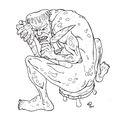Template:Selected anniversaries/February 11: Difference between revisions
No edit summary |
No edit summary |
||
| Line 71: | Line 71: | ||
||1920: Ernst Paul Specker born ... mathematician. Much of his most influential work was on Quine’s New Foundations, a set theory with a universal set, but he is most famous for the Kochen–Specker theorem in quantum mechanics, showing that certain types of hidden variable theories are impossible. Pic. | ||1920: Ernst Paul Specker born ... mathematician. Much of his most influential work was on Quine’s New Foundations, a set theory with a universal set, but he is most famous for the Kochen–Specker theorem in quantum mechanics, showing that certain types of hidden variable theories are impossible. Pic. | ||
||1920: Fred Basolo born ... inorganic chemist. He received his Ph.D. at the University of Illinois at Urbana-Champaign in 1943, under Prof. John C. Bailar, Jr.. Basolo spent his professional career at Northwestern University. He was a prolific contributor to the fields of coordination chemistry, organometallic, and bioinorganic chemistry, publishing over 400 papers. He supervised many Ph.D. students. With colleague Ralph Pearson, he co-authored the influential monograph "Mechanisms of Inorganic Reactions", which illuminated the importance of mechanisms involving coordination compounds. His autobiography, ''From Coello to Inorganic Chemistry: A Lifetime of Reactions'', was published in 2002. Pic search yes: https://www.google.com/search?q=fred+basolo | |||
||1921: Yozo Matsushima born ... mathematician. Pic search good: https://www.google.com/search?q=Yozo+Matsushima | ||1921: Yozo Matsushima born ... mathematician. Pic search good: https://www.google.com/search?q=Yozo+Matsushima | ||
Revision as of 08:26, 13 April 2019
1617: Mathematician, cartographer, and astronomer Giovanni Antonio Magini dies. He supported a geocentric system of the world, in preference to Copernicus's heliocentric system.
1618: Writer and alleged troll Culvert Origenes publishes his essay Man's Inhumanity to Man, which will profoundly influence three generations of Enlightenment-era thinkers.
1650: Mathematician and philosopher René Descartes dies. He is remembered as the father of modern Western philosophy.
1760: First known use of Japanese rod calculus to detect and prevent crimes against mathematical constants.
1847: Inventor, engineer, and businessman Thomas Edison born. He will develop the light bulb and the phonograph, among other inventions.
1884: Set theorist and crime-fighter Georg Cantor saves Edward Lear from attack by math criminals.
1898: Physicist and academic Leo Szilard born. He will conceive the nuclear chain reaction in 1933, and patent the idea of a nuclear reactor with Enrico Fermi.
1930: Mathematician, statistician, and crime-fighter Oskar Anderson publishes new theory of mathematical statistics based on Gnomon algorithm functions with applications in the detection and prevention of crimes against mathematical constants.
1931: Engineer and inventor Charles Algernon Parsons dies. He invented the compound steam turbine, and worked on dynamo and turbine design, power generation, and optical equipment for searchlights and telescopes.
- Charles Critchfield ID badge.gif
1944: Mathematical physicist and crime-fighter Charles Critchfield uses burst of neutrons to detect and prevent crimes against physical constants.
1973: Nuclear physicist and Nobel Prize laureate J. Hans D. Jensen dies. He shared half of the 1963 Nobel Prize in Physics with Maria Goeppert-Mayer for their proposal of the nuclear shell model.










